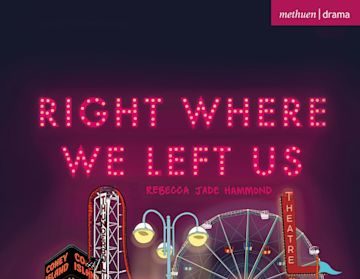Amy Louise Watkins went along to Chapter Arts Centre to take a look at Chippy Lane’s latest production, Right Where We Left Us, a three-hander by Papatango-shortlisted, Cardiff playwright Rebecca Jade Hammond, which offers a heartfelt examination of what happens instead of “happy ever after”.
Can an immediate but fleeting connection between two people be rekindled years later? Can time really heal a broken heart? What transpires instead of happy ever after? Chippy Lane’s latest production Right Where We Left Us, a poetic and humorous three hander, explores such questions. Written by Rebecca Jade Hammond, and directed by Chelsey Gillard, the play sees two rotating companies take to the stage for an unconventional view of what was, what wasn’t and what could have been.
Set in Barry Island, I (Hannah Daniel) and P (Jacob Ifan) – two writers whose connection was once inextricable – meet after years of separation; one an award-winning writer, the other an adopting mother. Colourful, quirky, and bold, I is perhaps a character almost all of us can relate to – someone whose ambitions were brutally replaced by a broken heart, a theme heavily explored in the production. With a minimalistic coffee shop set, the audience gets a glimpse into the lives of both characters, but most importantly, the lives they could have led.
Through a series of flashbacks, executed using a downstage separation from the coffee shop set, the characters chronical their relationship from the very first meeting, to their separation caused by the pandemic. As they both share their achievements and the separate lives they have led, feelings of resentment, frustration, and grief become apparent. Chippy Lane Productions latest play is the perfect exploration of what happens after, or instead of, happy ever after. Alongside the leading characters, we have T (Jonathan Hawkins) the coffee shop worker set on helping I address her emotions and anger towards P. There is no interaction between P and T, although it is clear that they are each aware of the relationships they share with I. T and I’s relationship is an interesting watch – the characters feel comfortable confining in each other, and T’s determination to help I confront her feelings of loss, betrayal, love, and anger is prominent throughout the performance. He serves as almost a guru for I, a symbol for the crystal she has put all of her faith into around her neck.
Perhaps the most prominent theme in Right Where We Left Us is grief, not of the relationship, but I’s lost ambition. Starting their writing journey together, with aspirations to break onto Broadway, majority of the flashback scenes take place in New York – where the couple vigorously work to achieve their goals.
However, after a confession of love and an abrupt rejection leaves her heartbroken, I returns home to Barry Island lost and unambitious. A poignant exploration on conflicting feelings between two people, I’s anger and pain becomes increasingly relatable as the play progresses. With an exceptional performance from Hannah Daniel, the screams and vivid descriptions of heartbreak will stick with you after leaving the theatre – a credit to the writing, direction, and acting. The power P has over I, even years later, is perhaps the most plaintive theme in the play. It’s the heartbreak that has caused her to lose all ambition in the industry she once inspired to thrive in, and his successes are only reminders of everything she has lost. In only 70 minutes, the play manages to delicately tread the path of heartbreak, and all of its corollaries, through dialogue alone.
The performance has minimal special effects and music, but what was used accentuated the tension between the two leading characters. The coffee shop scenes are quiet, focusing solely on the gritty dialogue, with a few laugh-out-loud one liners, between I and P. You feel a connection with the characters as the dialogue fluctuates between general conversation to heartfelt confessions of feelings, with incredible displays of emotion from both actors, emphasising the prominent themes of grief, love and power.
As the play progresses and I’s anger becomes more palpable, a flickering light, dimmed stage, and faint mist effectively partners the scene, with unnerving music slowly volumising alongside I’s increasingly audible monologue about her lost ambition and P’s successes. An abrupt drop in music and effects is then replaced by a harrowing scream of anger, a chilling scene that not only makes you feel for I’s character, but also adds a disturbing sense of relation. It’s a sobering moment in a play which takes its audience on a carousel of emotions, with an intensity that stays with you for some time after the lights have dimmed.
Right Where We Left Us plays in the Seligman Theatre in Chapter Arts Centre until Wednesday 5th October. Tickets are available here.











